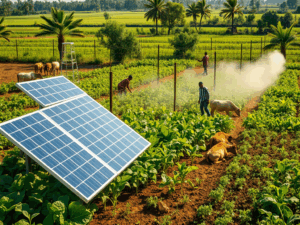
The organic produce market is booming globally, and Africa is no exception. With increasing awareness of health benefits, environmental sustainability, and higher nutritional value, the demand for organic produce is skyrocketing. This surge presents a golden opportunity for agripreneurs in Nigeria and across Africa to tap into lucrative markets and transform their agribusinesses.
The Organic Boom: Why Now?
Several factors contribute to the rising demand for organic produce. Consumers are becoming more health-conscious, seeking food free from synthetic pesticides, herbicides, and genetically modified organisms (GMOs). Additionally, there’s a growing recognition of the environmental benefits of organic farming, which promotes biodiversity, soil health, and reduces carbon footprints.
In Africa, urbanization and a burgeoning middle class are also driving this trend. With more disposable income, urban consumers are willing to pay a premium for healthier, sustainably produced food. This shift is not just limited to local markets but extends to international markets where African organic produce is highly sought after.
Nigeria: A Rising Star in Organic Farming
Nigeria is making significant strides in organic farming. The Organic Agriculture Project in Tertiary Institutions in Nigeria (OAPTIN) is one notable initiative that promotes organic farming practices among young farmers and students, equipping them with the skills needed to meet the rising demand for organic produce. OAPTIN collaborates with institutions like the University of Ibadan, Ahmadu Bello University, and the University of Agriculture, Abeokuta, to train students and local farmers in organic farming techniques.
Farmers like Helen Olayinka from Ogun State have successfully transitioned to organic farming with support from OAPTIN. Helen’s organic vegetables and fruits are now sold in local markets at a premium price, boosting her income and ensuring a healthier product for consumers.
Success Stories from Across Africa
The success of organic farming is not limited to Nigeria. Across Africa, agripreneurs are capitalizing on this growing market. In Kenya, the Organic Farmers Market in Nairobi has become a hub for consumers seeking fresh, organic produce. Farmers like Josephine Kiama have seen their incomes triple since switching to organic methods, thanks to higher prices and increased demand. Josephine’s farm produces a variety of organic vegetables, which she sells at the Organic Farmers Market and through direct deliveries to Nairobi residents.
In Uganda, the National Organic Agricultural Movement of Uganda (NOGAMU) has been instrumental in supporting organic farmers. NOGAMU provides training, resources, and market access to farmers, enabling them to produce high-quality organic crops. For instance, Samuel Kintu, a farmer from the central region of Uganda, now exports his organic pineapples to Europe, fetching premium prices and contributing to his community’s economic development.
Overcoming Challenges
While the opportunities are immense, transitioning to organic farming comes with challenges. Farmers need to adapt to new practices, which may initially be labor-intensive and costly. However, the long-term benefits, including higher yields, better soil health, and increased market value, outweigh these challenges.
Organizations like the Ecological Organic Agriculture Initiative (EOA-I) are crucial in this transition. EOA-I works across Africa, providing farmers with training, certification, and market linkages. By supporting farmers through this transition, they ensure the sustainability and profitability of organic farming.
Tapping into Global Markets
For African farmers, the potential to tap into global organic markets is significant. Europe and North America are leading importers of organic produce, and African farmers are well-positioned to meet this demand. Certifications such as the EU Organic Certification and USDA Organic are essential for accessing these markets. Programs like the Nigeria Export Promotion Council (NEPC) are helping farmers gain these certifications, opening doors to lucrative international markets.
A remarkable example is the Serendipalm Company in Ghana, which produces organic palm oil and exports to Europe and the United States. Serendipalm works with over 1,000 smallholder farmers, ensuring they adhere to strict organic farming standards. This initiative has not only provided farmers with higher incomes but has also promoted sustainable farming practices in the region.
Conclusion
The emerging market for organic produce presents a transformative opportunity for agripreneurs in Nigeria and across Africa. By embracing organic farming, farmers can improve their incomes, contribute to environmental sustainability, and meet the growing consumer demand for healthy, high-quality food.
As awareness and demand for organic produce continue to rise, now is the time for African farmers to seize this opportunity. With the support of initiatives like OAPTIN, NOGAMU, and EOA-I, the transition to organic farming can be smooth and profitable. By tapping into both local and global markets, African farmers can lead the way in the organic revolution, ensuring a healthier future for all.
For those looking to invest in Africa’s agribusiness sector, supporting organic farming ventures is a wise and impactful choice. As the organic boom continues, the potential for growth and profit is immense, making this an exciting time for agripreneurs across the continent. The time to act is now.




